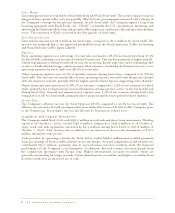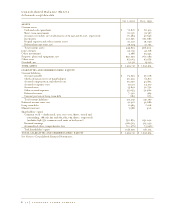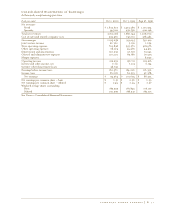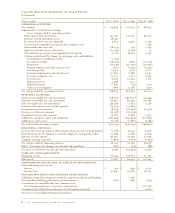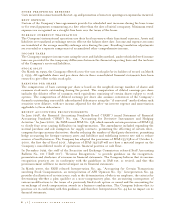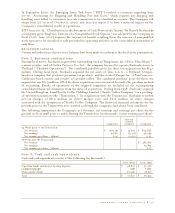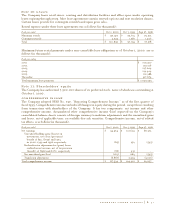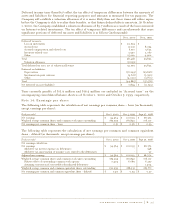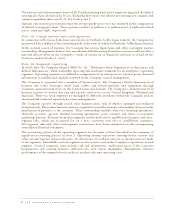Starbucks 2000 Annual Report Download - page 20
Download and view the complete annual report
Please find page 20 of the 2000 Starbucks annual report below. You can navigate through the pages in the report by either clicking on the pages listed below, or by using the keyword search tool below to find specific information within the annual report.
store preopening expenses
Costs incurred in connection with the start-up and promotion of new store openings are expensed as incurred.
rent expense
Certain of the Company’s lease agreements provide for scheduled rent increases during the lease terms
or for rental payments commencing at a date other than the date of initial occupancy. Minimum rental
expenses are recognized on a straight-line basis over the terms of the leases.
foreign currency translation
The Company’s international operations use their local currency as their functional currency. Assets and
liabilities are translated at exchange rates in effect at the balance sheet date. Income and expense accounts
are translated at the average monthly exchange rates during the year. Resulting translation adjustments
are recorded as a separate component of accumulated other comprehensive income.
income taxes
The Company computes income taxes using the asset and liability method, under which deferred income
taxes are provided for the temporary differences between the financial reporting basis and the tax basis
of the Company’s assets and liabilities.
stock split
On March 19, 1999, the Company effected a two-for-one stock split for its holders of record on March
5, 1999. All applicable share and per-share data in these consolidated financial statements have been
restated to give effect to this stock split.
earnings per share
The computation of basic earnings per share is based on the weighted average number of shares and
common stock units outstanding during the period. The computation of diluted earnings per share
includes the dilutive effect of common stock equivalents consisting of certain shares subject to stock
options. The computation of diluted earnings per share also assumes conversion of the Company’s
formerly outstanding convertible subordinated debentures using the “if converted” method when such
securities were dilutive, with net income adjusted for the after-tax interest expense and amortization
applicable to these debentures.
recent accounting pronouncements
In June 1998, the Financial Accounting Standards Board (“FASB”) issued Statement of Financial
Accounting Standards (“SFAS”) No. 133, “Accounting for Derivative Instruments and Hedging
Activities.” In June 2000, the FASB issued SFAS No. 138, which amends certain provisions of SFAS 133
to clarify four areas causing difficulties in implementation. The amendment included expanding the
normal purchase and sale exemption for supply contracts, permitting the offsetting of certain inter-
company foreign currency derivatives, thereby reducing the number of third party derivatives, permitting
hedge accounting for foreign-currency assets and liabilities and redefining interest rate risk to reduce
sources of ineffectiveness. The Company has adopted the provisions of SFAS 133/138 as of October 2,
2000, the first day of fiscal 2001. Adoption of SFAS 133/138 will not have a material impact on the
Company’s consolidated results of operations, financial position or cash flows.
In December 1999, the staff of the Securities and Exchange Commission released Staff Accounting
Bulletin No. 101 (“SAB 101”), “Revenue Recognition,” to provide guidance on the recognition,
presentation and disclosure of revenues in financial statements. The Company believes that its revenue
recognition practices are in conformity with the guidelines in SAB 101, as revised, and that this
pronouncement will have no material impact on its financial statements.
In March 2000, the FASB released Interpretation No. 44, “Accounting for Certain Transactions
involving Stock Compensation: an interpretation of APB Opinion No. 25.” Interpretation No. 44
provides clarification of certain issues, such as the determination of who is an employee, the criteria for
determining whether a plan qualifies as a non-compensatory plan, the accounting consequence of
various modifications to the terms of a previously fixed stock option or award and the accounting for
an exchange of stock compensation awards in a business combination. The Company believes that its
practices are in conformity with this guidance, and therefore Interpretation No. 44 has no impact on its
financial statements.
P. 36 starbucks coffee company


